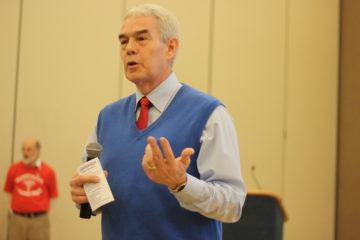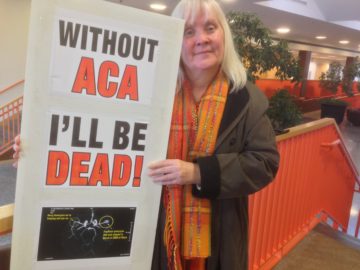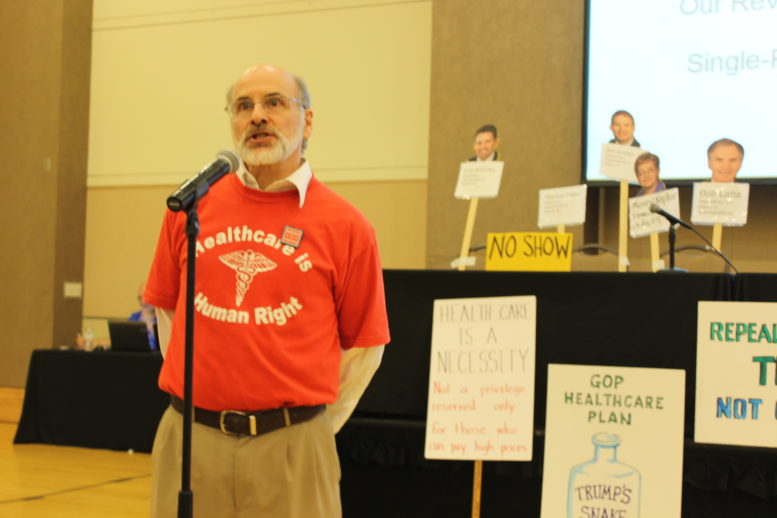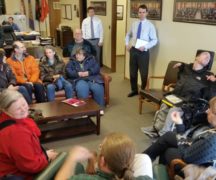By DAVID DUPONT
BG Independent News
A town hall forum on the future of health care drew about 150 people. Many of them had something to say. Many had questions for their legislators.
Lawmakers, though, were in short supply. The dais in the front of the community room in the Bowling State University student union had signs representing a bipartisan all-star team of no-shows, including U.S. Rep. Bob Latta and U.S. Rep. Marcy Kaptur. Kaptur did send a letter expressing her regret at not being present and praising the attendees for getting involved.
Two state lawmakers did make the forum. State Sen. Randy Gardner (R-Bowling Green) and State Rep. Michael Sheehy (D-Oregon).

Randy Gardner
Gardner, as a Republican, knew he was in hostile territory, but he received applause on several occasions for showing up, listening to comments, sometime shouted, even when they were expressed while he was still talking.
Gardner could not provide what many in the crowd wanted, any sort of commitment to take specific action. As Dr. Johnathan Ross, of Toledo, noted little of what concerned the crowd was in the hands of state government.
Gardner made it clear that his purview was the state, and he urged those present, a large number of whom were his constituents, based on a show of hands, to monitor the progress of the state budget.
As a legislator, he said, it is his job to listen to his 360,000 “bosses”– and that means not coming to a conclusion about anything as soon as it is presented. He said he hopes the forum is just part of an ongoing give-and-take between himself and his constituents.
He must channel the personal stories into some kind of legislation as he’s done decades ago after hearing about family with a child with hemophilia. He’s now working with a family with a child with cystic fibrosis on legislation that may assist them. As a legislator that’s what he does. He tries to address the concerns of constituents through legislation.
What Gardner refused to do was take a stand on the Affordable Care Act, nor would he comment on plans to replace the ACA with tax credits.
Concerns for the fate of the law known as Obamacare were what led to Our Revolution in Northwest Ohio to stage the town hall meeting. Dennis Slotnick, of Our Revolution and a regional coordinator for Single-Payer Action Network Ohio, said national concerns about “the ungluing” of the ACA have prompted the followers of “a dear beloved senator from Vermont” Bernie Sanders to organize such gatherings in 140 congressional districts.
Sheehy asserted that for whatever problems the ACA has, it has helped people. He said he’s talked to nurses in clinics who said after the ACA was passed they were seeing women who had not been to a doctor for 25 years.
Sheehy praised Republican Gov. John Kasich for expanding Medicaid in the state and pressing the Trump Administration to provide the federal funds that make that possible.
The uncertainty about what will happen on the federal level hangs over deliberations on the state budget, Gardner said. Federal action may force the legislature back into session late this year to adjust the budget.
Several in the audience voiced disapproval of any plan that replaces the ACA with tax credits. Those would be worthless to the poor who pay no federal income tax, and most valuable to those in upper tax brackets.
Gardner noted that the plan has not been formally presented as legislation and is still in flux.
“It’s all over the internet,” a voice from the back of the room called.
When Gardner searched the internet for the plan, he found a version that differed from the one attendees described.
Carol Hall made an economic development argument for the ACA. Her son was able to leave his job in a corporate law firm, to start his own practice. He was able to do that because he knew he could get health insurance without being employed. And now he will be employee people.
Despite efforts by the legislators and others to keep the proceedings non-partisan, some members of the crowd made it clear they held one party to blame.
One woman insisted that Republicans wanted to blame rising insurance premiums on Obamacare. They were rising before the ACA was passed, they said.
Gardner tried to explain bad decisions were made by both sides, and referred, much to the displeasure of some, to former President Bill Clinton’s calling Obamacare “the craziest thing in the world” during the recent presidential campaign.
Several once and future Democratic candidates or their representatives were given time to speak.

Barbara McGrady
As the meeting broke up, Barbara McGrady, of Fremont, stood outside the ballroom in the student union. She’d retrieved her sign that had leaned against the dais during the meeting. She’d not gotten a chance to tell her story during the forum.
The message was simple. “Without ACA I’ll be Dead.”
In 2008, diagnosed with a brain aneurysm. This was before the ACA, when those with pre-existing conditions could be denied coverage. With coverage by Medical Mutual she had one aneurysm removed which involved removing two chunks of her skull – she has the indent to in her head to prove it.
But she has two more aneurysms and they are growing.
The cost of insurance for her and her husband rose “astronomically.” They were paying $1,300 a month for insurance and couldn’t shop round for cheaper coverage.
She said she was elated when Obamacare came in and her rates dropped dramatically. They’ve recently ballooned again, now to $800 a month. Treatment at the Mayo Clinic and the Cleveland Clinic is no longer covered,
She’s still facing life-threatening surgery to deal with the other two. She doesn’t want to have it done prematurely just because she’s afraid the ACA will end.
And she wants the best quality care. She’d love to go back to the Cleveland Clinic.
All that’s uncertain. What McGrady does know is: “If ACA is done away with, I’ll be dead.”





